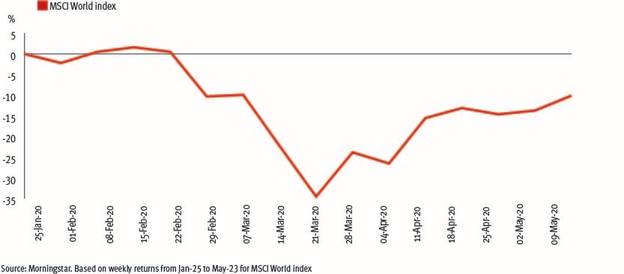
Risk aversion in a post-Covid world will manifest itself in investor moves towards developed markets and away from more traditional businesses, analysts have predicted.
Investment professionals will tell you there is no such thing as a crystal ball when it comes to working out where to put your clients’ money. There is, however, a heat map, launched by Kroll – a division of Duff & Phelps that specialises in risk analysis.
Kroll’s global teams of analysts have analysed hundreds of geographies and sectors to ascertain what effect Covid-19 has had on investment prospects across the world, mapping this against performance data, as well as known policy changes and central bank efforts to curb the financial impact of Covid-19.
According to Louis-David Magnien, EMEA regional managing director in the business intelligence and investigations division at Kroll, the map has been designed to help investors and their advisers identify trends and tweak portfolios, within the context of individual’s specific requirements.
Mr Magnien said: “In terms of geographies, Covid-19 hit some developing markets somewhat later than developed markets. And the fiscal response from developing markets has been lower than that of developed markets.
"So the strength of these states or companies or banks in [the former] may be less supported than in Europe or the US or Japan, and there will be more dislocation in these markets.
“For this reason, geographically developed markets will probably remain a safer bet, depending on the level of risk one is willing to take.”
Some developing markets have weathered the storm very well, such as Vietnam, which the Kroll heat map places as having little to no negative impact as a result of Covid-19. But other developing markets will experience big knock-on effects, such as in Bangladesh.
The country’s textiles and clothing supply to western shops, a significant economic contributor to the country’s GDP, have been severely disrupted.
“With developing markets, the disruption is not just Covid-19 related, but other restrictions in travel and movement and flows of money will be felt relatively for quite some time, in our view,” Mr Magnien added.
Stimulus
One of the question marks of this crisis is whether countries’ individual responses have been the most appropriate.
For example, Brazil’s government has been accused of failing time and again to provide the right level of support, but some think Europe is over-stretching itself to offer help.
Last week, the European commissioner for the economy Paolo Gentiloni announced a “landmark” stimulus package of some €750bn (£661bn) to help economies damaged by the pandemic. Some of this will be in the form of loans that do not need to be repaid.
Japan also announced its cabinet had approved an additional $1.1tn (£800bn) budget to counter the recession.
The Kroll heat map focuses on public and regulatory reports to buttress qualitative analysis of economic, social welfare, and other socio-economic indicators of 61 key regions of the world.







